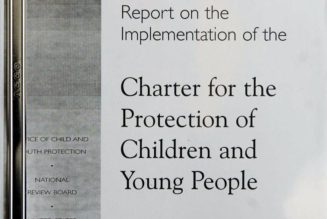
DIFFICULT MORAL QUESTIONS: Beware the moral pitfalls that can turn licit toleration into sinful cooperation.
Q. In a secular workplace, would it be morally wrong for Catholic employees to sign a mandatory professional code of conduct in which they agree to not discriminate against anyone based on a variety of factors, including “sexual orientation,” “gender identity” and “gender expression”? Would acknowledging these terms in writing be considered promotion of the ideology that they represent? What if the alternative to not signing such a code of conduct were termination of employment and/or revocation of a professional license? — Kaylyn
A. Since you have no intention of denying any rightful moral or professional claims to your gender-confused colleagues, signing such a document should pose no problems. But since you are dealing with the whole area of gender ideology, you will likely be expected to “respect” false claims.
If there were no bad consequences of refusing to sign the non-discrimination policy, you should refuse. Those who make and implement such policies ordinarily assume that non-marital sexual relations and the rejection of our sexed bodily identity are not harmful and sometimes morally legitimate. And Christians should not want to materially cooperate in any way with the advancement of such assumptions. (I have commented more generally on material cooperation elsewhere, so I will limit my comments to your scenario.)
But as you say, your employment and professional license are at stake. So we need to ask whether material cooperation under these circumstances is licit.
On the one hand, your signature might merely imply that you agree to refrain from certain expressions of strong public disagreement with LGBT ideology. Given the burdens that you risk if you refuse, your signing of the document in these circumstances seems to me morally licit.
Your signature would not bind you never to speak out against offensive initiatives, although you know the risks you take in doing so. There might be a time when a line is crossed that requires you to stand up for the truth. And your signature certainly does not — indeed cannot — require you to suppress your own personal witness to the truths of the Catholic faith. Your signature rather would express a general willingness to tolerate the status quo for the sake of preserving your job.
You should be conscious, however, that licit toleration of wrongful ideas can tempt one over time to wrongfully tolerate them. One wrongfully tolerates the errors of gender ideology when one, among other things, ceases to see clearly their falsity and harmfulness, begins to believe they express truths about people’s true identity, and starts to think that opposition to such ideas is judgmental and hateful. In other words, when our toleration becomes affirmation, then we do wrong. (This is not to imply that tolerating evil is always licit; it’s not. But a discussion of the limits of toleration is for another essay.)
On the other hand, the term “discriminate” in the code of conduct might be loaded. It might not imply merely that you refrain from certain public expressions of disagreement, but it might require you to perform actions that could be wrongful to perform.
For example, non-discrimination might mean you are expected to use erroneous pronouns to refer to gender-confused individuals, or to wear or display on your desk LGBT paraphernalia such as “pride” flags or T-shirts during the month of June, or donate money to pro-LGBT causes, or attend pro-LGBT receptions. You should avoid such things as they ordinarily express wrongful cooperation with those who promote gender ideology.
All this is to say, that before signing, you should make sure you understand clearly the expectations that will accompany your signature. Try to find out subtly whether the policy is merely a formality, or whether its implementation is ideologically hard-edged.
If on paper some compromising action is or appears to be required of you, then you might approach your manager off the record and ask what kind of wiggle room there is for someone who has a conscientious objection to such behavior arising from your Christian faith and support for traditional marriage.
Hopefully, you will find a way to work around the pitfalls posed by the policy. As I said above, if all it requires of you is a measure of self-censorship, you can do this in a morally upright way while maintaining your own integrity as a practicing Catholic.
If, however, you judge that it requires you to do something you shouldn’t do, and there is no wiggle room, then you might have to begin looking for another place of employment.
Either way, entrust yourself and this difficult situation to God. He knows what you need and will certainly assist you to do what is right.








